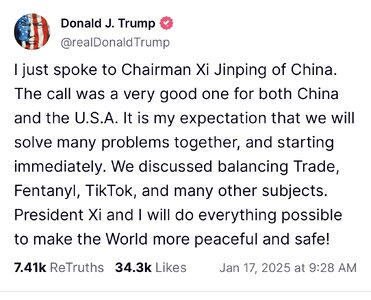Continued
“… Many strategists and diplomats see the world returning to something like the Concert of Nations that emerged in Europe after the Napoleonic wars of the early 19th century. Under that system, praised by the late Henry Kissinger for preventing global war for nearly a century, empires recognized each other’s spheres of influence worldwide, including the right to oppress and dominate less powerful countries and peoples within those spheres.
The Monroe Doctrine of 1823 was the American version of this idea, proclaiming U.S. hegemony over the Americas and a refusal to get involved in European wars. This month Mike Waltz, Trump’s incoming national-security adviser, described the president-elect’s vision as “Monroe 2.0.”
Russian President
Vladimir Putin’s frequent pronouncements about a multipolar world reflect a similar nostalgia for 19th-century imperial power. The idea of multipolarity appeals to many people in the developing world eager to shake off American domination, but in practice it would take even more power away from the weaker nations, said German diplomat Volker Perthes, a former U.N. Undersecretary-General.
… There is widespread agreement around the world that the U.N. system is increasingly out-of-date. The U.K. and France, both Allied powers in World War II, were made permanent members of the U.N. Security Council in 1945 and so have veto power over its decisions. Much larger countries do not, including India, Germany, Brazil and Japan. Attempts at reform have been thwarted since the 1960s.
“The United Nations system was formed when most of the countries of the world were not sovereign entities, and whether we like it or not, it cannot reflect a true representation of the world’s current realities,” said Barbados Prime Minister Mia Mottley.
“If we want to hold on to the past, we better get eyes in the back of our head rather than on the front of our head, because we are seeing the dying of the current world order.”
… Cooperation among the great powers at the U.N. began to unravel following the U.S. invasion of Iraq in 2003, and ground to a halt after Russia’s full-scale war on Ukraine in 2022. Now the Security Council is deadlocked on all major issues, making the world body largely irrelevant.
… Yet it’s too early to write off the world body completely, said Michael Keating, executive director of the European Institute of Peace and a former senior U.N. diplomat in Somalia, Afghanistan and the Palestinian territories.
“People may come back to the U.N.—or something very like it—having been through the pain of realizing that the U.N. may be terrible, but the alternative to it is even worse,” he said.
“I just don’t know what the alternative is, other than a dog-eat-dog world.” …”


